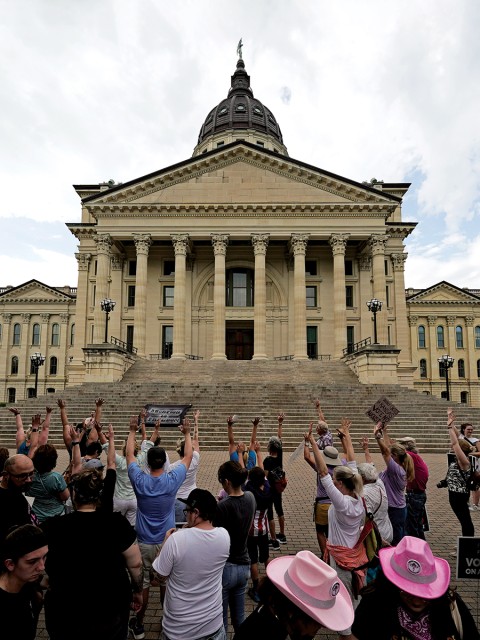The faith leaders who helped preserve abortion access in Kansas
In the fight over an antiabortion amendment, Protestant pastors and Catholic sisters worked to show that there is more than one faith-based view.

Abortion rights advocates outside the Kansas Statehouse after the US Supreme Court’s Dobbs ruling on June 24, 2022 (AP Photo / Charlie Riedel)
On August 2, 2022, all eyes were on Kansas. Weeks prior, the US Supreme Court had overturned Roe v. Wade, revoking the federal constitutional right to an abortion and clearing the way for Republican-led legislatures to ban abortions at the state level. Now, with an amendment on the ballot that would remove the existing right to an abortion from the state constitution, Kansans were about to be the first voters in a post-Roe nation to weigh in on abortion access.
It seemed a foregone conclusion that the amendment, known by its supporters as “Value Them Both”—a riff on the line that a constitutional right to an abortion is incongruent with the value Kansans place on both women and children—would pass in the historically populist Sunflower State. Despite having recently elected two popular Democratic governors, Kansas hasn’t voted for a Democratic president since Lyndon B. Johnson and hasn’t sent a Democrat to the US Senate since 1930. Kansas is also the place where, 14 years ago, an antiabortion extremist gunned down George Tiller, a Lutheran doctor who provided late-term abortions.
What’s more, the amendment had well-heeled, influential friends in Kansas’s Catholic bishops. The Catholic Archdiocese of Kansas City in Kansas—the largest single donor on either side of the issue—spent almost $3 million to drum up support for the amendment, according to tax documents, while the Wichita diocese spent $550,000 in 2022 and the Kansas Catholic Conference spent another $275,000.




